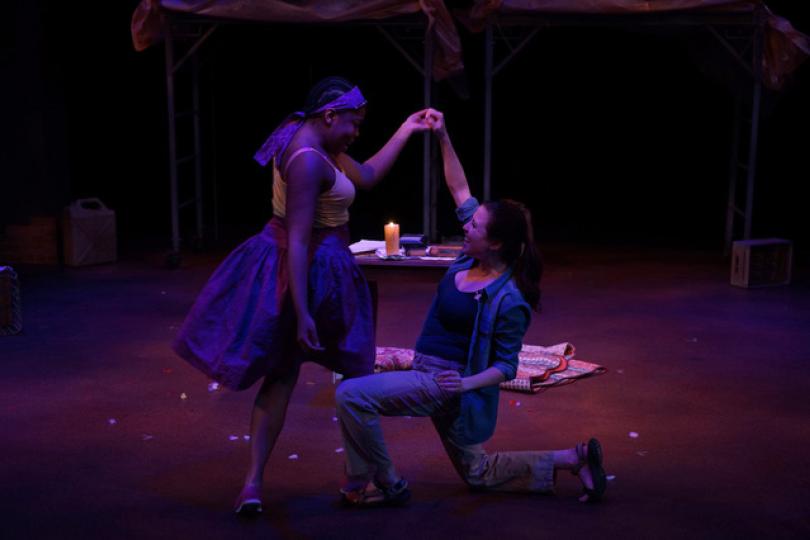The Recycling of The Cardboard Piano: A Metaphor

Park Square, with the help of some of their loyal board members, has chosen another play that pushes the boundaries and potential comfort levels of a midwestern, middle class audience, (missionaries, minorities, and gays...oh MY)! Straight from the 2016 Humana Festival, Hansol Jung’s bleak tale explores life’s questions in venerable vulnerability. The South Korean playwright scrupulously opens the play during the height of the Ugandan Civil War, New Year's Eve of Y2K, on the building site of a Christian missionary church. Two teenage girls, native Ugandan ADIEL (Kiara Jackson) and American missionary CHRIS (Adelin Phelps), are getting ready to celebrate their love for one another in a secret wedding ceremony. Respectful of their religion, the two girls attempt to fashion their wedding vows as closely guided by the Bible as they can, considering neither want to be the “husband.” Because there is no witness but God himself they use a tape recorder to validate the occasion. The rest of the evening devolves into an unexpected roller coaster of gruesome civil unrest, violence, homophobia, children confronted with the brutality of the adult world, culminating in a troubled pastor trying to right his mangled past, a broken women looking for closure and peace, and the impossible negotiation between country, faith and chosen family. Whew!
The first act provides the context. In the middle of war it’s often the children who are forced to grow up too fast. The marvelous Jackson and Phelps, are not only tasked with this challenge but are also playing teenagers in love! Much like the inherent trap in Shakespeare’s Romeo and Juliet, it’s hard to imagine these characters are in their early teens, facing adult decisions, challenges and heartbreak.
It is important especially with a 15 year gap in time between the two acts, that these young women come across as hopeful, romantic, light and youthful. Phelps tells the poignant story of her Father’s gift of a cardboard piano as a metaphor for love, hope for future and what it will bring. You can see these young women with their lives ahead of them! In this heightened environment, the need to love, the need to exert freedom and independence, to break boundaries, and rebel is palpable.
Teenagers think they get it, they know everything, they “act” more adult than actual adults sometimes, and everything is life or death. Add civil war, true love, and their self importance and immortality goes through the roof! The actors do an admirable job to represent this essence but I felt the relationship didn’t quite have the passion and weight that it needed. Michael Jemison is heartbreaking as a child soldier who has been forced into a world of war and violence and Ansa Akyea’s powerful presence commands the stage as a soldier and then 15 years later as the current church pastor PAUL. The events of the first act are shocking but sets up the meat of the moral dilemma which, I find, is the strength and spirit of the play.
Act Two opens at the same church 15 years later. The war is over and the new pastor and his wife are celebrating their second wedding anniversary. CHRIS enters, she’s back in Uganda. Her father's ashes are packed into a pod to be planted in the place that ultimately took his spirit from his family long ago. She also needs to wrestle some demons that wait for her in this formative place where first love lived and was taken away. The story of the “cardboard piano” is unexpectedly recycled.
I don’t want to give this away, and it’s worth your time and money to experience for yourself, but this simple sanguine story of the fantasy piano is misappropriated and it’s a doozy. The four talented actors, with the intuitive guidance of director Signe V. Harriday, play multiple characters with commitment and surprising depth. The later is a necessity as it would be problematic and uneven if this quartet wasn’t so well matched.
Beyond the vibrant storytellers, the production values of the piece are excellent. The simple, organic environment is created flawlessly with the set (Sarah Brandner), lighting (Michael P. Kittle) and the beautiful sound and music designed by Jacob M. Davis. Credit must also be given to the actors who mastered the Afrikaans accent and their proficient dialect coach, Foster Johns. It was just enough to be authentic and effective without overpowering the test.
This story explores the notions of redemption and how, if at all, one can ever atone for past deeds horribly done. It forces the audience to look at humanity under the veil of fear and the instinct to survive. It also illustrates the idea that someone looking for redemption might try to do everything SO right to be absolved in the eyes of God, that he might be doing everything unequivocally wrong.
The questions and loose ends left unraveled in the last half of this play are instant discussions you must work out aloud with friends. I felt awed, lost, devastated, yet still oddly hopeful that we are doing our best to hold up the mirror and force one another to be accountable, to be aware, and to ultimately, forgive. You have two more weekends to catch this lovely and emboldened play. I highly recommend you go with an open heart and mind and take in as much of this exclusive piano lesson as you can...and definitely bring your friends.




